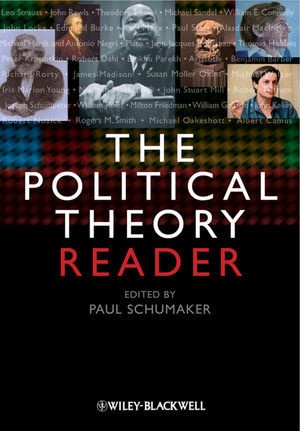Read more
Informationen zum Autor Paul Schumaker is Professor of Political Science at the University of Kansas, where he has taught courses in political theory and community politics since 1972. Dr Schumaker has authored several books on political theory, including Critical Pluralism, Democratic Performance, and Community Power (1991). His most recent book is the political theory textbook From Ideologies to Public Philosophies (Wiley-Blackwell, 2008). Klappentext Utilizing 100 key readings, The Political Theory Reader explores the rich tradition of ideas that shape the way we live and the great issues in political theory today.* Allows students to see how competing ideological viewpoints think about the same political issues* Provides readers with direct access to authors covered in the From Ideologies to Public Philosophies text* Facilitates discussions by having readings arranged thematically throughout text* Extracts of works specifically chosen to focus on topics central to issues covered in chapters. Zusammenfassung This collection presents 100 key readings that address the contested philosophical assumptions and competing principles of politics. Contributions include writings from the founders of the major ideological perspectives of the 19th and 20th Centuries, to the most important political theorists and philosophers of the modern world. Inhaltsverzeichnis Preface Acknowledgments 1. Political Theory, Public Philosophy, and Pluralism Introduction Leo Strauss, "What Is Political Philosophy?" Judith Shklar, "Political Ideology" Theodore J. Lowi, "America's Old and New Public Philosophy" Avigail Eisenberg, "Reconstructing Political Pluralism" William E. Connolly, "Pluralism: A Prelude" Part I: Ideological Voices 2. Nineteenth-Century Ideologies Introduction John Locke, "The Second Treatise of Government" National Assembly of France, "The Declaration of the Rights of Man and of the Citizen" Edmund Burke, "Reflections on the Revolution in France" Karl Marx and Friedrich Engels, "The Communist Manifesto" Emma Goldman, "Anarchism: What It Really Stands For" 3. Twentieth-Century Ideologies Introduction Vladimir I. Lenin, "State and Revolution" Giovanni Gentile, "The Philosophic Basis of Fascism" Paul Starr, "Why Liberalism Works" John Kekes, "A Case for Conservatism" 4. Newer Quasi-Ideologies Introduction Michael J. Sandel, "America's Search for a New Public Philosophy" Richard John Neuhaus, "Public Religion and Public Reason" Susan Moller Okin, "Justice, Gender, and the Family" Arne Naess, "The Environmental Crisis and the Deep Ecological Movement" Michael Hardt and Antonio Negri, "Globalization and Democracy" Part II: Philosophical Assumptions 5. Ontological Conceptions Introduction Plato, "The Theory of Forms" Walter Ullman, "Ascending and Descending Theses of Government" Ken Wilber, "The Great Chain of Being" Jean Jacques Rousseau, "On the General Will" Friedrich Engels, "Marx's Materialist Conception of History" Charles Darwin, "Natural Selection" T. H. Huxley, "Evolution and Ethics" Judith Butler, "Contingent Foundations: Feminism and the Question of 'Postmodernism'" 6. Conceptions of Human Nature Introduction Herbert Deane, "St. Augustine's Conception of Fallen Man" Thomas Hobbes, "The Natural Condition of Mankind" C. B. Macpherson, "The Early Liberal Model of Man" Karl Marx, "Estranged Labor" Peter Kropotkin, "Mutual Aid" John Rawls, "The Rationality and Motivations of Parties in the Original Position" Michael Sandel, "The Procedural Republic and the Unencumbered Self" ...

